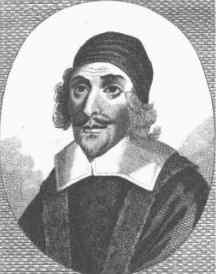Thomas Scot facts for kids
Thomas Scot (also spelled Scott) was an English politician who lived a long time ago. He was a Member of Parliament, which is like being a representative in the government. Sadly, he was put to death because he was one of the people who decided to execute King Charles I. This act is called "regicide."
Contents
Growing Up
Thomas Scot went to Westminster School when he was young. He might have also studied at Cambridge University. In 1626, he married Alice Allinson. Thomas worked as a lawyer in Buckinghamshire. He became important as the treasurer for the area's County Committee between 1644 and 1646.
He became very influential in the Committee. In 1645, he was chosen to be a Member of Parliament for Aylesbury. Thomas was known for giving long, powerful speeches in Parliament. He was also good at working behind the scenes. He knew how to make friends and get people to vote his way. One person who didn't like him said he would "whisper Treason" and encourage war.
Political Journey
Scot's Beliefs
Before a big event called Pride's Purge, it's a bit hard to know exactly what Thomas Scot believed about how the government should work. However, from his writings and speeches, many historians think he believed in a republic. This means he thought the country should be run by elected representatives, not a king. His actions after 1648 definitely show he strongly supported a republic.
Standing Against the King
From the start of the English Civil War, Scot believed that King Charles I should face strict rules. Later, he strongly disagreed with the Treaty of Newport. He said that it was never the right time for a peace treaty with a king who couldn't be trusted. He believed that anyone who fought against the king had to be ready to go all the way. He felt that any peace with the king would harm good people.
Role in the Republic
After Pride's Purge, Thomas Scot became a main organizer of the King's trial and execution. He was key in setting up the Republic. Along with Henry Vane, Oliver Cromwell, and Arthur Heselrige, he became one of the Republic's main leaders.
Trial and Execution
Opposing Cromwell
In 1653, the Republic ended. Thomas Scot became one of the loudest opponents of the new government, called the Protectorate. He organized people against Oliver Cromwell within Parliament. He was elected as a Member of Parliament for Wycombe in 1654. He was elected for Aylesbury again in 1656. In 1659, he was elected for Wycombe once more. Then he sat for Aylesbury again in the restored Rump Parliament.
Facing Justice
When Charles II of England became king again, Thomas Scot was in great danger. This was true for all 59 men who had signed the order to execute Charles I. Thomas Scot escaped to Flanders, but he later gave himself up in Brussels.
He was put on trial and found guilty. He was executed on October 17, 1660, for the crime of regicide.
The Trial
Thomas Scot's trial took place on October 12, 1660. Many people believed the outcome was already decided. He was accused of being part of the court that tried King Charles I. He was also charged with signing the orders to start the court and to execute the King. People even said he wanted his gravestone to read: "Here lies Thomas Scot, who judged the late King to die."
Many witnesses spoke against him. One witness was William Lenthal, who was the Speaker of the Long Parliament. He said that Scot had supported the actions against King Charles in Parliament.
Scot's Defense
In his defense, Scot argued that what was said in Parliament should not be used against him in a lower court. He said that he had the authority of the Long Parliament for his actions against the King. He also argued that the court had no right to decide if that authority was truly from a Parliament or not. When asked to show an example of the House of Commons having such power, he said he could show many. However, he was stopped by the court when he started talking about ancient times.
Thomas Scot presented these and other strong arguments. He didn't expect the jury to find him innocent. Instead, he wanted to explain his actions to the country and to future generations. As expected, the jury was told to find him guilty.
Last Words
At his execution, Thomas Scot said some final words. He stated, "I say again; to the Praise of the Free Grace of God; I bless His name He hath engaged me in a Cause, not to be Repented of, I say, Not to be Repented of." He meant that he was proud of what he had done and did not regret it.
See also
 | Dorothy Vaughan |
 | Charles Henry Turner |
 | Hildrus Poindexter |
 | Henry Cecil McBay |


